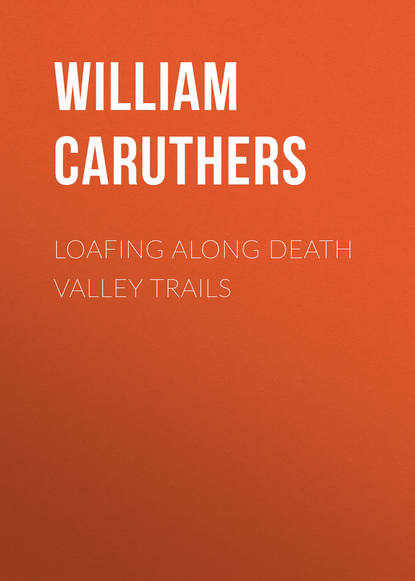По всем вопросам обращайтесь на: info@litportal.ru
(©) 2003-2024.
✖
Loafing Along Death Valley Trails
Настройки чтения
Размер шрифта
Высота строк
Поля
Ben cocked an ear, but made no comment.
“Now take that Quail Springs hole,” Louise went on. “If he had my pickup he could take off a wheel, put on a belt and haul up the muck in one tenth the time, and instead of hoofing it in the sun he could ride in a cool cab and haul his supplies in.”
There comes a weak moment in everyone’s life and this was Ben’s. He traded the burros for the Ford and one of the best prospectors on the desert was ruined forever.
Ben had a mortal fear of women and nothing could convince him that any unattached woman wasn’t always lying in wait for any loose man.
Ben went into the Johnnie country to prospect and passing through I looked him up. He was living in a tin shack in the canyon leading to the old Johnnie Mine. I asked Ben about his luck.
“Last prospecting I did was right out there.” He pointed to the slope in front of his house. “Good placer ground too.”
“Why did you quit?”
“Woman,” Ben grumbled. “Don’t know yet what come over me, but I took a woman for a partner.” He pointed to a boulder a few hundred yards away. “There’s where I wanted to start digging. It’s rich dirt. She wanted to start up there near her shack.”
“Well, what difference did it make?” I asked.
“I see you don’t know women. I hadn’t been working up there by her house no time before she called me to get her a bucket of water. Bucket was half full. Next day she wanted a board in the kitchen floor nailed down. Didn’t need any nail. ‘There’s some fresh apple pie on the table,’ she says. I told her I didn’t like pie. I’m crazy about pie but I knew her game. She calculated if I ate with her two – three times I’d be a dead pigeon. So I told her she could have the claim and walked off.”
Ben struck a happier note when he informed me that he didn’t need to work any more and at last had attained the one ambition of his life. “Come inside and I’ll show you.” Beaming as only a man can when he sits on top of the world, he approached a table and it flashed over me that I would see a certified check for a fortune.
There was a cloth over the table and he carefully wiped his big hands before touching it. He wet his big, broad thumb and forefinger and gave them an extra wipe on the sides of his shirt, a wide smile on his face and I had a vicarious thrill that a man who could barely read and write had at last achieved that which he most wanted in life. He started to remove the cloth, but paused. “Always said if I ever struck it rich, first money I spent would be for one of these dinkuses.”
He flipped the cloth aside. I stared incredulous. It was a portable typewriter.
He replaced the cover with the gentle care of a mother putting her baby to bed and I left him, sure that God was in his heaven with an eye on Ben.
Contemporary with Ben was Joe Volmer, who lived in a dugout in Dublin Gulch. I had seen royalty from afar and once I had dined with a sultan on horsemeat and fried bananas, but no king ever attained the majesty of Joe. He was tall, erect, wore a white sailor’s hat and carried a cane. His mustache was always waxed to a needle point, after the manner of Kaiser Wilhelm. Though he increased his small pension by selling home brew, he always managed to give the impression that he was descending to your level when he accepted the two bits you left on his table.
He was neat as he was lordly and forever scrubbing his pots and pans. He kept the dugout immaculate and when I first saw him standing on the ledge in front of his door, calmly surveying the valley below, he posed like an Alexander the Great, with the world conquered and trussed at his feet.
I had never seen him until one day a tourist came into the store and asked Charlie for a stop-watch. Charlie told him he didn’t carry stop-watches. Shortly after the tourist had gone, Joe came in for a stop-watch. “Don’t keep ’em,” Charlie said. “Helluva store,” Joe barked and strode out.
“A curious coincidence,” I said. “Two calls for a stop-watch in the same day away out here.”
“It’s no coincidence,” Charlie said. “Just Joe Volmer. He’s in every day asking for something he knows I haven’t got.”
After Joe left, Jack Crowley came for his mail. Brown was in the cage set apart for the post office. He had just received several sheets of six-cent stamps – twice as many as he needed. “Jack,” he said, “when you see Joe tell him I’m out of six-cent stamps.” Within an hour Joe shoved a five dollar bill through the window. “Give me five dollars’ worth of six-cent stamps,” he ordered. Brown picked up the bill, filled the order and never again did Joe ask for merchandise not in stock.
Joe sold a claim and decided he needed a refrigerator to keep the beer cold. So he picked up a Monkey Ward catalogue and ordered a big white enamel number large enough for a hotel. Joe thought a refrigerator was just a refrigerator and he strutted around telling everybody. He had to widen the dugout door and waiting customers were more than eager to help him get the machine in place. He loaded the shelves and told them to come back in a couple of hours and cool their innards.
They came with their tongues hanging out. Joe set out the glasses and passed the bottles. Herman Jones picked one up and shook it. The cork hit the ceiling. “Hotter’n hell,” Herman said. “What sort of cooler is that?” He went over and looked. “Gas. You dam’ fool. Nearest gas is Barstow.”
Until Joe’s death he used the refrigerator to store pots and pans.
Discovered in his dugout in a serious condition, Joe was rushed to Death Valley Junction 28 miles away, where the Pacific Coast Borax Company maintained a hospital which was in charge of Dr. Shrum, who was rather realistic and somewhat cold blooded.
Just as they had gotten Joe in the doctor’s office, another patient was brought in. Dr. Shrum looked at the new comer and then at Joe. “Take Joe out,” he ordered. “He’s going to die anyway.”
Joe was wheeled outside and a moment later was dead.
George Williams, a Spanish American war veteran, retired to Shoshone on a pension of $50. Since food was cheap, George had more money than he knew what to do with. He kept five burros. He never prospected, but roamed the country and thought nothing of taking a 300 mile trip across the roughest terrain in the region. After spending his summers in the high country, he would return to Shoshone in winter. There he had a five acre ranch fenced in and a neat cabin.
Every day George would come to the store and buy a pound of chocolates. “I’ve got a sweet tooth,” he would explain.
Charlie, sure that no one could eat as much chocolate as George bought, was a bit curious as to what George did with it and trailed him one day through the mesquite to find George feeding the candy to his burros.
George was not a drinker, but on one occasion he joined a party and went on a bender. He awoke next morning with a horrible hangover and was so humiliated that he left Shoshone and never returned. He went over to Sandy and died in the ’30s.
One day George started to tell me a story as we sat on the bench. His burros were grazing in the nearby salt grass. Every time he reached the climax of his yarn, he would jump up to go after a straying burro. When he retrieved that one, another would wander off and George would leave me again.
For one entire summer I listened to the beginning of that yarn and every morning would remind him of it.
“Where was I?” he’d say. “Oh, yes, I was telling you about the girl climbing out of the fellow’s window just before daylight. Well, she went – ”
Then George would jump up and start for a burro, and I never learned what happened to the torrid romance after the girl crawled out of her lover’s window.
Chapter XXI
Roads. Cracker Box Signs
Any resemblance that a Death Valley highway bore to a road was a coincidence prior to 1926, and few tourists traveled over them unless two cars were along. “Just follow the wheel tracks and keep your eyes peeled for the cracker box signs along the road,” was the usual advice to the novice who didn’t know that tracks left by Mormons’ wagons nearly a century before may be seen today.
One of these led me to the bank of a mile-wide gash made by cloudbursts. To locate the missing link I climbed the nearest mountain and on a lonely mesa came at last upon a piece of shook nailed to a stake and stuck into the ground. But it had nothing to do with roads. A crude inscription read:
Montana Jim
July 1888
A dam good pal
Reverently I stepped aside. Never again would I see a finer tribute to man. A few rocks bleached white in the sun outlined a sunken grave. Crossed upon it were Jim’s pick and shovel. It was not difficult to recreate what had happened there. Jim and his friend looking for gold. Jim’s faltering and the sun beating him down. Jim’s partner knowing that Jim’s moniker would identify him better than a surname to anyone who passed that way interested in Jim. Out in the desert 100 miles from human habitation he couldn’t call an undertaker, so he dug a hole, wrapped Jim in his canvas, rolled him in and hoped that God would reach down for Jim.
At that period it was not an uncommon experience for the early tourist to lose his way by doing the natural thing at a crossroads and take the one which showed the sign of most travel. Often he would find later that he had followed a trail to a mine miles away. Often too, it led to disaster.
The story of roads begins at Shoshone with Brown. In his trips in and around the valley, he erected signs to prevent the traveler from losing his way and his life. “I would like to see Death Valley country,” people would say to him, “but everyone tells me to stay out.”
Inyo county had little revenue and that was used in the more populous Owens Valley 150 miles west. The east side (the Shoshone area) was totally neglected. Letters and petitions protesting the unfair distribution of county funds were tossed into the waste basket. “Roads in that cauldron? Who would use ’em? Nobody ever goes there but a few old prospectors.”
This was true but it was also true that on Owens Valley’s west side the lakes and forests of the High Sierras were attracting a paying crop of vacationists and the supervisors knew it would be political suicide to divert this traffic from its towns and resorts. The county-wide opinion as to chance for relief was expressed in the slang of the day by a loafer on the bench at Shoshone: “About as much as a wax mouse would have against an asbestos cat in a race through hell. They have the votes and elect the supervisors.”
The east side had never had a member on the board. In the Shoshone precinct were less than 40 voters. In Death Valley a few prospectors who would have battered down the gates of hell if they thought gold lay beyond, poked around in its canyons. A few Indians. A few workmen for the Borax Company. In 1924 Brown put his suitcase in his car, filled the tank and said to those about: “Fellows, I’m running for Supervisor.” “You’ll be the mouse,” quipped a friend.
“I’ll let ’em know somebody lives over here anyway…”
Skirting the urban strongholds of the gentlemen in office Brown knocked at every door in the district. He berated none nor claimed he had all the answers to an obviously difficult problem. “… Roads built there will lead here. Everybody will gain…” Then to the next cabin and the next canyon until he’d seen every voter.
Before the opposition knew he had been around, he was back in Shoshone selling bacon and beans.







